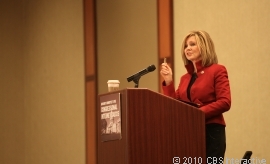WASHINGTON–The new Congress has only just started, but its Internet and technology agenda is quickly filling up. Top on the list for Republicans will be efforts to undo the Federal Communication Commission’s late-December “Open Internet” Order. After that, expect bipartisan action on efforts to slake the voracious appetite for wireless spectrum of mobile Internet users and possible reform of the $8 billion Universal Service Fund.
That was the message heard today by attendees at the State of the Net conference here, organized by the advisory committee to the Congressional Internet Caucus. Members of Congress, senior staffers, administration officials, and federal regulators converged (once a sprinkling of sleet was cleared off Washington streets) for the annual conclave, now in its seventh year.
Other items already in the docket for the new Congress include data privacy, patent reform, and new Internet antipiracy enforcement powers for customs agents. But these items are much less likely to generate new legislation. A possible consumer privacy “bill of rights,” along with patent reform, for example, have become perennial topics for federal hand-wringing, always discussed but never acted on.
 “Congressional hurricane” on Net neutrality
“Congressional hurricane” on Net neutrality
The day got off to a bold start, as Congresswoman Martha Blackburn (R-Tenn.) issued a “wake-up call” to conservative members of Congress to take seriously the threat that overzealous lawmaking could jeopardize the fast-growing digital economy.
Blackburn is one of a large number of Republican (and a small number of Democratic) legislators angered by both the content and process leading to the FCC’s “Open Internet” decision, which imposes new Net neutrality limits on broadband providers.
Blackburn predicted that the new rules, which have yet to take effect, “won’t be around too long.” The FCC thought that it was filling a “regulatory vacuum,” Blackburn said. “But they’ll be met with a Congressional hurricane.”
In the first days of the new session, Blackburn introduced the Internet Freedom Act, a short bill that would bar the FCC from any regulation of “the Internet or IP-enabled services.”
Before the Internet Freedom Act is taken up, the House Energy and Commerce Committee has promised to introduce a “Resolution of Disapproval” under the Congressional Review Act. Under this 1996 law, a simple majority of Congress can vote to nullify new rules issued by federal agencies within 60 days of their publication.
To read more, visit: Tech priorities for new Congress: From old to new



I’m not certain the place you’re getting your info, but great topic. I must spend a while finding out more or understanding more. Thank you for fantastic information I was looking for this information for my mission.